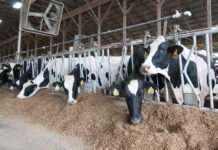Contact: Marsha Boswell, [email protected]
For audio version, visit kswheat.com.
Against a backdrop of American flags suspended from multihued combines, U.S. Representative Tracey Mann (KS-01) sat down with U.S. House Agriculture Committee Chairman Glenn ‘GT’ Thompson (PA-15) on May 2 to gather input on Farm Bill priorities during a food and agriculture listening session.
The session marks the first official Farm Bill listening session since a Senate field hearing in 2017 and follows a late April roundtable discussion with Kansas Senator Roger Marshall and U.S. Senator John Boozman, the ranking member of the U.S. Senate Committee on Agriculture, Nutrition, and Forestry. The current version of the Farm Bill expires on September 30, 2023, so these sessions are part of many others happening across the country as lawmakers negotiate the future of the Farm Bill.
“We are all here because we care about agriculture, with getting ag policy right,” Rep. Mann said. “And we want to see Kansas and American farmers, ranchers and producers thrive. That’s why we planned this session to listen, share and make this Farm Bill the strongest one in American history. For that to happen, we must come together with our diverse perspectives and find points of unity.”
Conducting this listening session within the Big First congressional district was a barometer of the needs of U.S. agriculture. Inside the Saline County machine shed of Justin Knopf – immediate past president of the Kansas Association of Wheat Growers – farmers, ranchers, agricultural producers, and leaders in Kansas agriculture gathered to emphasize the importance of Farm Bill programs from crop insurance to food aid and everything in between.
“I’m just incredibly grateful that they took the time to come out and spend time listening in our community, in front of a wheat field, in front of harvesters,” Knopf said. “What was important for me was for them to experience the sense of community here, the good people that I partner with on a daily basis in our operation – my neighbors, bankers, crop insurance agents, USDA staff and other business people in the community. I wanted them to have a sense of how this legislation impacts all those individuals and our ability to get our job done and done well.”
Extreme Drought Illustrates Importance of Crop Insurance
With a wheat field just behind the flatbed trailer serving as the stage, Knopf used his welcome to walk the lawmakers and attendees through the current growth stage of his wheat crop and his expectations for a below-average yield. He recognized his wheat is in better shape than many and pointed out that thousands of Kansas wheat acres have been abandoned or will not be harvested this year due to extreme drought conditions. The persistent drought also emphasizes the importance for crop insurance, which was repeated by several commentators throughout the morning session.
“Farmers deal with a lot of risk; it’s an inherent part of our business and what our families deal with,” Knopf said. “Crop insurance is probably the most important and most fundamental way that we have to manage some of that risk in extreme weather events, be it drought like we’re experiencing currently or floods like they recently experienced in California.”
“We heard a lot of that message today from the farmers who spoke up and made comments on crop insurance. In the wake of a disaster, crop insurance is what allows us to have the means to put in next year’s crop.”
Session Highlights Kansas Ties to Food Aid
Attendees also expressed support for other Farm Bill programs, including food aid assistance programs like USAID Food for Peace, which can trace their origins to the ideas of a young Kansas farmer. In September 1953, Peter O’Brien, a farmer and rancher from Cheyenne County, suggested at his county Farm Bureau meeting that Kansas farmers could give some surplus grain to countries in dire need — saving lives and building goodwill all at once. A resolution was drafted at the county level and was adopted by the Kansas Farm Bureau and the American Farm Bureau Federation.
In 1954, U.S. Senator Andy Schoeppel, also from Kansas, sponsored the Agricultural Trade Development and Assistance Act, a bill based on the grassroots resolution. The act was then signed into law by President Dwight D. Eisenhower. The law became the basis for today’s modern food aid programs. The United States now sends more food aid to countries in need than any other nation and more wheat is used in the United States as in-kind aid than any other commodity.
Wheat is not only donated for direct use but is also a popular commodity for monetization, a development program where donated commodities are sold within the recipient country, and the proceeds support agricultural development projects. In his comments, Ken Wood, board member for the National Wheat Foundation and retired farmer from nearby Chapman, emphasized the need to keep wheat as a commodity donation, rather than switching the programs to relying on monetary assistance.
Rep. Mann and Chairman Thompson each echoed their support for food aid programs in the Farm Bill during their remarks.
“This is having a positive impact on families around the world,” Chairman Thompson said. “As I like to say, people with full bellies are less likely to engage in war and terrorism. And so that makes all of you and that makes the American farmer a champion for world peace.”
Lawmakers Commit to Strengthening Export Market Development Programs
Both lawmakers also expressed their commitment to increased funding for the Farm Bill-authorized export market development programs – the Market Access Program (MAP) and the Foreign Market Development (FMD) program. Both programs need more investment to strengthen their effectiveness as MAP’s authorized funding has not changed since 2006 and FMD funding has remained the same since 2002.
“When you look at the return on investment for taxpayer dollars on those programs, that covers the swath of all agricultural products,” Rep. Mann said. “We have got to keep investing there. I strongly support increasing our investments for MAP and FMD.”
Rep. Mann is helping lead the effort to double the funding for this pair of agricultural export market development programs administered by the USDA’s Foreign Agricultural Service (FAS). He is a lead sponsor for the Agriculture Export Promotion Act (H.R. 648), which is currently making its way through the U.S. political process, along with the Senate equivalent – the Expanding Agricultural Exports Act (S. 176).
“Congressman Mann has led strongly and sponsored legislation to double MAP and FMD funding,” Knopf said. “I applaud his efforts on that front and Chairman Thompson following suit in supporting that push because the return on investment is very high.”
Rural Input Helps Shape Farm Bill Priorities
The stated and submitted comments on export market development, food aid, crop insurance and many other topics will travel from the machine shed in Saline County to the marble halls of Washington, DC. There, they’ll be combined with the comments from other listening sessions across the country to help shape the next Farm Bill. While timing and details are still being determined, one fact is certain – lawmakers are listening to what U.S. producers need to continue doing what they do best – providing food, fuel and fiber for the world.
“Agriculture inspires us to look back at our shared heritage, engage in the present and plan for the future,” Rep. Mann said. “That’s what today is about – planning for the future. Producers do everything they can to pass the tradition of agriculture on to their children. And we have conversations like this one today to make sure that we’re able to do that.”
Following the listening session, Rep. Mann, Chairman Thompson, and the Farm Journal Foundation held a panel discussion titled, “The Role of Innovation in Global Food Systems” at Kansas State University. Additional panelists included Dr. J. Ernest Minton, Dean of K-State College of Agriculture; Gregg Doud, Vice President of Global Situational Awareness & Chief Economist of Aimpoint Research; and Tyler Lund, Farm Journal Foundation Farmer Ambassador.
Watch the full panel discussion at https://www.k-state.edu/media/farmbill/ and keep track of Farm Bill progress and other legislation impacting Kansas wheat farmers at https://kswheat.com/advocacy.
###
Written by Julia Debes for Kansas Wheat



